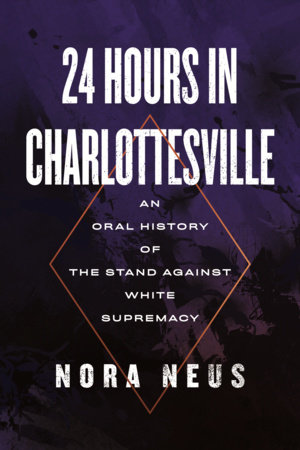On July 18, former Charlottesville reporter Nora Neus will release her first solo book, 24 Hours in Charlottesville: An Oral History of the Stand Against White Supremacy. While countless accounts of the Unite the Right rally have been published since 2017, Neus’ book stands out for its assemblage of survivor and witness-led accounts of the events.
After graduating from the University of Virginia in 2016, Neus worked at local station NBC29 for a year and a half before leaving to report for CNN. Shortly after starting at CNN, Neus returned to Charlottesville to cover the Unite the Right rally for Anderson Cooper.
“I had my first idea of an oral history of August 12, 2017, on about August 18, 2017,” says Neus. “I pitched a story to CNN to do an oral history. … I had just left my job, and there was this incredible backstory of the day, behind the scenes of how the local journalists were covering it in a way that I thought would be really interesting as an oral history. The pitch didn’t get accepted, I never wrote that piece, but I always had that in the back of my head.”
Despite an abundance of coverage of Charlottesville’s summer of hate, widespread misinformation and misconceptions persist, according to Neus. “Six years after the events of August 12 and that weekend and the whole summer of hate, there still is such a misconception about what actually happened,” she says. “It got really frustrating to have to try to explain over and over again that this was not something that came out of nowhere. … There was a very serious, concerted effort to try to warn policymakers and leaders at all levels of government and public life that this was going to happen. There was going to be a white nationalist riot, and it would be violent, and they would try to kill people.”

While Neus had considered collecting an oral history of the build up to and events of the Unite the Right rally for years, it was the Sines v. Kessler lawsuit that prompted the journalist to start writing her book. “I was still at CNN at the time, and just felt like there needed to be an account of what happened,” she says. “And when I went to go look for one that was very thorough, I didn’t feel like there was one thorough account yet.”
Neus collected accounts from numerous people in and around Charlottesville on August 11 and 12, 2017. While she felt the project was important, recounting the experience was still hard for Neus and the survivors and witnesses. “I thought it was going to be really emotionally taxing and difficult to write, so I prepared myself for that, and then it was way worse than I thought it would be. I mean, just on a very personal level, my nightmares about August 11th and 12th came back,” says Neus. “There’s a big responsibility I feel in honoring those stories.”
She says she also has regrets about what she didn’t do that weekend. “I said that to someone I was interviewing, that I really regretted not doing more. I don’t know even what that would have looked like, but just that I wish I had done more. And [they were] like, ‘We don’t need your regret, we need you to work moving forward.’ And I hope this book is part of that work.”
To ensure that her book supports the community, Neus compensated activists and community members for their responses, and a portion of the book’s profits will go to survivors.
While 24 Hours in Charlottesville can be emotionally taxing to read, Neus stresses that the accounts shared remain painfully relevant today. “I think the main reason that people should read the book, even though it is a hard read … is that this is not over. This fight is very much just beginning. There is already a rise in fascist activity in the U.S., and it is going to be groups of citizens that have the best shot of combating that hate,” she says.
